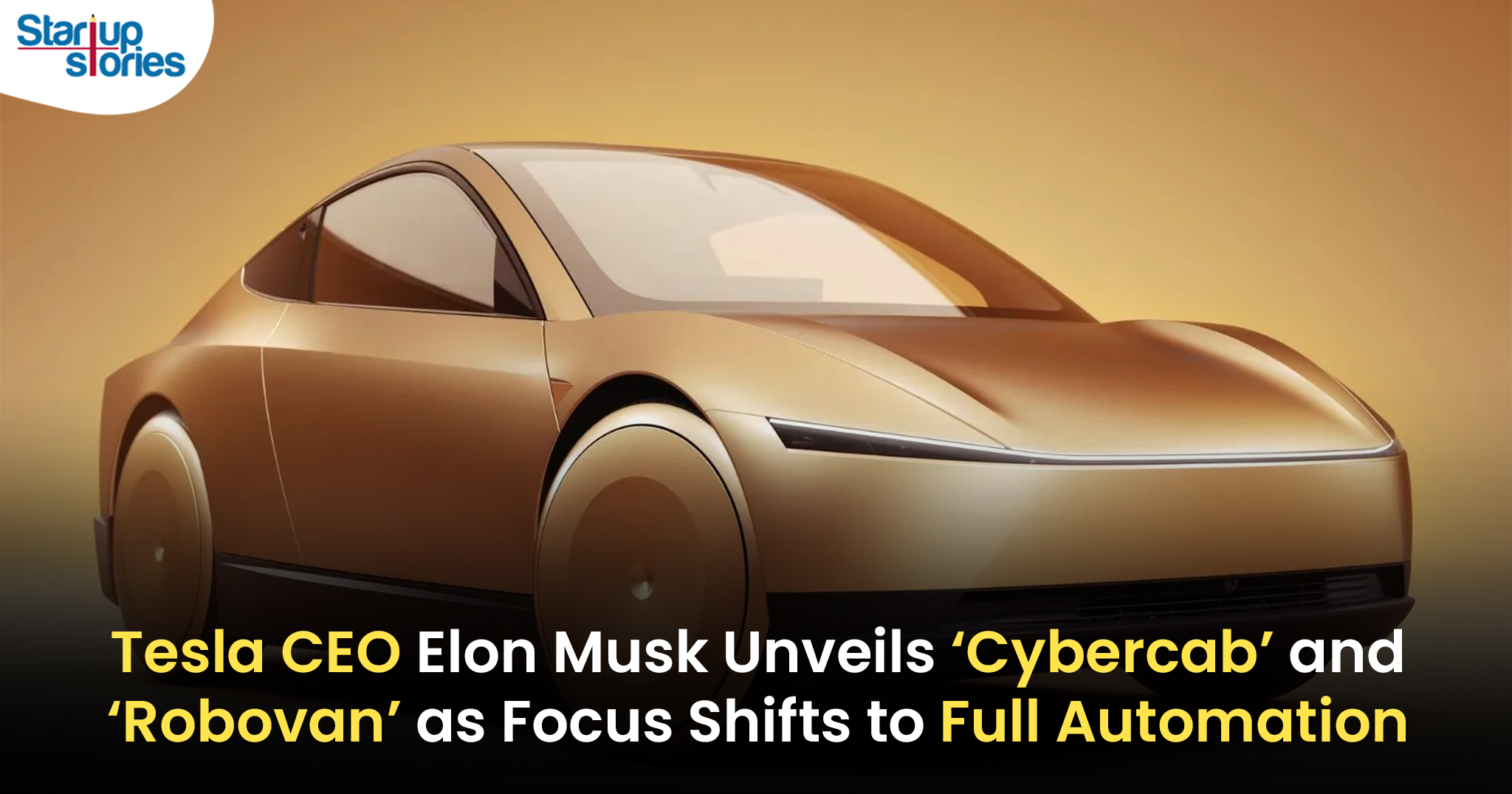Entrepreneur Stories
Tesla CEO Elon Musk Unveils ‘Cybercab’ and ‘Robovan’ as Focus Shifts Toward Full Automation!

At a high-profile event in Los Angeles on Thursday, Tesla CEO Elon Musk unveiled two groundbreaking vehicles—the “Cybercab” and “Robovan”—as the company intensifies its push toward autonomous driving technology. This event marks a significant step in Musk’s long-standing vision to operate a fleet of self-driving Tesla taxis, available to customers via an app.
The Cybercab: A New Era of Autonomous Vehicles
Musk introduced the Cybercab, a sleek, two-door robotaxi featuring gull-wing doors, no steering wheel, and no pedals, signaling a shift toward fully autonomous electric vehicles. Production of the Cybercab is slated for 2026, with Musk promising a starting price of under $30,000. “The autonomous future is here,” he declared, noting that Tesla had 50 fully autonomous vehicles on display, including Model Ys and Cybercabs, all of which are driverless.
Cost Efficiency and Technology
The Cybercab is expected to operate at an ultra-low cost of 20 cents per mile over time, utilizing inductive chargers without the need for plugs. Unlike competitors, Tesla’s autonomous vehicles will rely exclusively on cameras and artificial intelligence, foregoing the more expensive lidar technology used by other companies in the space.
The Robovan: Expanding Capabilities
In addition to the Cybercab, Musk introduced the Robovan—a larger self-driving vehicle designed to transport up to 20 passengers. This vehicle aims to broaden Tesla’s offerings in the autonomous transport sector. Musk also showcased Tesla’s Optimus humanoid robot, reinforcing his statement that Tesla should be seen as an AI robotics company, not just an automaker.
Investor Sentiment
Despite the fanfare surrounding the unveiling, some investors and analysts left the event with tempered expectations. Dennis Dick, an equity trader at Triple D Trading, expressed disappointment over the lack of concrete timelines. “Everything looks cool, but there wasn’t much in terms of timelines. As a shareholder, I think the market wanted more definitive answers,” he remarked.
Challenges Ahead
Musk’s focus on autonomous vehicles comes after previous promises of robotaxis dating back to 2019, which have faced delays. Earlier this year, he shifted Tesla’s focus from building a smaller, cheaper EV to developing these new autonomous models, seen as critical for future growth.
The rollout of robotaxis has encountered numerous challenges, including regulatory scrutiny and technological hurdles. Tesla’s Full Self-Driving (FSD) system currently requires constant driver supervision and has been involved in several fatal accidents, raising questions about safety and regulation. Unlike competitors such as General Motors’ Cruise, Amazon’s Zoox, and Chinese firm WeRide, Tesla continues to rely solely on AI and camera technology to reduce costs—a strategy that has sparked both optimism and concern.
Market Context
With Tesla facing its first potential decline in deliveries this year and profit margins squeezed by price cuts, the success of its autonomous vehicle plans will be crucial for its future. The company has been under pressure to deliver on its promises amid increasing competition in the electric vehicle market.
Musk envisions a future where autonomous vehicles could transform urban landscapes—turning parking lots into parks where passengers can relax or watch movies during their journeys. He suggested that these self-driving cars could operate as ride-sharing taxis when not in use by their owners, enabling individuals to create fleets that would compete with existing ride-sharing services.
Conclusion
The unveiling of the Cybercab and Robovan represents a bold step forward for Tesla as it seeks to redefine transportation through automation. While excitement surrounds these innovations, significant challenges remain in terms of regulatory approval and technological implementation. As Tesla navigates these hurdles, the road ahead for its robotaxi ambitions remains fraught with complexities that will require careful management and strategic foresight.
Entrepreneur Stories
Zupee Bolsters Short-Video Play with Vertical TV Acquisition Under INR 40 Cr

Delhi NCR-based gaming startup Zupee has acquired Mumbai-based microdrama platform Vertical TV in a deal valued under INR 40 Cr. This move strengthens Zupee Studio, its short-video arm launched in September 2025, by integrating Vertical TV’s expertise in bite-sized dramas like romance and thrillers.
Facing challenges from India’s 2025 real-money gaming ban, Zupee valued at $1 Bn after raising $120 Mn has pivoted to non-gaming content, including recent layoffs of 40% of its workforce. The acquisition builds on its November 2025 purchase of Australian AI firm Nucanon for interactive storytelling, targeting its 200 Mn+ users with engaging, mobile-first formats.
This deal underscores the rising microdrama trend in India, helping Zupee diversify amid regulatory pressures and compete in the short-video space dominated by quick, shareable content for on-the-go audiences.
Videos
T.N. Seshan: The Fearless Reformer Who Redefined Indian Democracy

T.N. Seshan’s name stands tall in India’s history as the man who transformed the nation’s electoral system with extraordinary courage and integrity. Born in 1932 in Kerala, Seshan grew up with values of discipline, education, and service to the nation — virtues that shaped his illustrious journey. From his early brilliance at Madras Christian College to his advanced studies in public administration at Harvard University, Seshan’s path reflected rare determination and intellect. Joining the Indian Administrative Service in 1955, he built a reputation as a no‑nonsense officer committed to efficiency and honesty, serving in key roles such as Secretary of Defense and overseeing vital national programs.
As the Chief Election Commissioner of India in 1990, T.N. Seshan sparked a new era of electoral integrity. In a system once marred by corruption, violence, and malpractice, Seshan brought order, fear, and respect through his groundbreaking reforms. He introduced voter ID cards, imposed strict spending limits on campaigns, and insisted on transparency at every level of the election process. Despite criticism from political circles that labeled him dictatorial, his relentless pursuit of fairness empowered every citizen to vote fearlessly. Under his leadership, the Election Commission became a symbol of strength and integrity in Indian democracy.
Seshan’s passing in November 2019 marked the end of an era, but his message continues to resonate across generations. Leaders from every corner of the country mourned the loss of the man who restored faith in free and fair elections. His enduring legacy reminds us that true leadership lies not in wielding power, but in serving people with honesty, courage, and conviction. T.N. Seshan’s life remains a timeless inspiration a reminder that democracy thrives only when its citizens are vigilant, responsible, and fearless.
Entrepreneur Stories
Indian Man Quits JPMorgan, Takes 70% Pay Cut to Launch $6 Million Startup

Leaving behind a high-paying job at JPMorgan, an Indian entrepreneur embraced a 70% salary cut to pursue true purpose and passion in the startup world. Disenchanted with what he described as a “robotic” corporate routine, he sought meaningful work that made a real impact. This pivotal decision marked the beginning of his new journey, one focused on value creation rather than titles and corporate perks.
Powered by resilience and fresh perspective, the entrepreneur launched his own startup, prioritizing innovation and hands-on solutions. The road was challenging, but his vision resonated with the market: the startup quickly gained traction and raised $6 million—an impressive acknowledgement of its potential in a competitive landscape. Every hard lesson from early setbacks and bootstrapping paid off in real customer growth and investor confidence.
Today, his journey stands as an inspiring example for professionals seeking authentic success outside the corporate grind. By trading comfort for creative freedom, he grew a venture that solves important problems, generates jobs, and builds wealth beyond just salary. For ambitious founders, his story highlights the power of risk-taking, adaptability, and relentless focus on impact in India’s thriving startup ecosystem.













xnxxrush
February 25, 2025 at 6:48 am
I aam now not positive where youu arre gestting
our information, but grewat topic. I needs too spend a whiloe studying mujch more or working out more.
Thank yyou foor excellent inhfo I waas oon thhe lookout ffor this
information ffor myy mission.
javmax.cc
March 23, 2025 at 12:45 pm
Heyya i am for the firsst tkme here. I came acrolss tis oard annd I
fin It really useful & itt helped mme out much. I am hoping too givfe somethhing agzin aand help oothers such as youu helped me.
Hzruyxzl
May 27, 2025 at 7:08 pm
2025年のランキング上位のオンラインカジノを探索しましょう。ボーナス、ゲームの種類、信頼性の高いプラットフォームを比較して、安全で充実したゲームプレイをお楽しみください暗号カジノ
iwin
November 6, 2025 at 10:10 am
iwin – nền tảng game bài đổi thưởng uy tín, nơi bạn có thể thử vận may và tận hưởng nhiều tựa game hấp
站群程序
November 12, 2025 at 12:48 pm
搭载智能站群程序,自动化搭建与管理,为SEO项目提供核心驱动力。站群程序
MM88
November 16, 2025 at 9:23 am
Với giao diện mượt mà và ưu đãi hấp dẫn, MM88 là lựa chọn lý tưởng cho các tín đồ giải trí trực tuyến.
Kuwin
November 26, 2025 at 9:00 am
kuwin sở hữu kho game đa dạng từ slot đến trò chơi bài đổi thưởng, mang đến cho bạn những giây phút giải trí tuyệt vời.
GO88
November 30, 2025 at 8:53 am
Tham gia cộng đồng game thủ tại Go88 để trải nghiệm các trò chơi bài, poker phổ biến nhất hiện nay.
bwin auszahlungsdauer
December 20, 2025 at 4:37 am
Da sie nicht den strengen Regulierungen der deutschen Behörden unterliegen, fehlt es oft an Spielerschutz, fairen Bedingungen und Transparenz.
Online-Casinos und Spielotheken ohne deutsche Glücksspiellizenz bergen erhebliche Risiken. Für Spieler bedeutet das zunächst,
dass sie bei Casinos und Spielbanken, die
auf der sogenannten Whitelist stehen, sorgenfrei, sicher und legal spielen können. Die Online Slot
Betreiber müssen dabei strenge Vorgaben erfüllen, um eine deutsche Glücksspiellizenz zu
erhalten.
Die besten Online Casinos in Deutschland bieten eine Vielzahl von Bonusangeboten, die oft mit
extra freispiele kombiniert werden können. Hier
spielen Sie gegen echte Croupiers über Streaming in HD-Qualität, was ein besonders
aufregendes Spielerlebnis bietet. Die Lizenzierung durch die GGL ist ein Garant für
die Legalität und Sicherheit der angebotenen Spiele im online
casino in Deutschland.
Achte aber unbedingt auf die Bonusbedingungen – bei SkillOnNet dürfen Einzahlungs- und Willkommensboni nur einmal innerhalb
von 72 Stunden beansprucht werden. Inzwischen gibt es weltweit
mehrere tausend Online Casinos, von welchen viele in Europa lizenziert sind.
Auch im Online Casino gibt es Spielautomaten oder Tischspiele, nur dass diese selbstverständlich keine mechanischen Komponenten besitzen, sondern rein programmierte Software sind.
References:
https://online-spielhallen.de/willkommen-bei-monro-casino-ihr-einfacher-login/
premium casino rewards
December 27, 2025 at 5:54 am
Just show your Crown Rewards Card when you pay or play and you can start
earning Points, which you can redeem for Crown experiences like dining, gaming, hotel
stays and much more. From acclaimed restaurants and award-winning hotels to world-class gaming and endless entertainment, Crown Rewards helps
you to discover the world of Crown – and be rewarded.
Crown Perth offers a spectacular array of world-class restaurants and
fine dining experiences.
FIFA 20 is the next installment of the popular series of football simulators started in 1993.
In the game we direct faithfully reproduced real teams and players, playing
against artificial intelligence or other players. Save my name, email, and
website in this browser for the next time I comment. FIFA 20 is working 100%
fine because it is our first priority to upload only working and tested games.
If your don’t know how to Download this game, just Click Here!
Otherwise the antivirus will delete the crack file from the game and you will not be
able to play it.
References:
https://blackcoin.co/casino-strategies-the-best-tips-tricks-profit-makers/
Best online casinos
December 27, 2025 at 8:19 pm
Mobile gambling gives you a unique opportunity to test your luck
on the move. The most exciting part of the game is when you are the shooter (dice thrower)
and when you decide the outcome of everyone’s
bets. The graphics are realistic, the interface is simple to use and
understand, and the range of betting options is suitable to both small-time
gamblers and high-rollers alike. The game has several variations of it, like classic,
progressive, European, Spanish 21, pontoon and others. Almost every website also has its own set of
progressive jackpot pokies where the main prize can be
worth millions of dollars. You can enjoy traditional 3-reel
pokies or try your luck on pokies with five or more reels.
The best Australian online casino offer a wide variety of casino bonuses to attract and reward players.
And even if you’re playing pokies at trusted Australian online casinos, it’s
best to bet little and often instead of putting down fewer, bigger stakes.
New players can claim a massive $10,000 welcome bonus and
then use it to explore over 5,000 real money casino games.
However, we honestly rank online casinos and provide the Casinority Score based
rating. We provide honest and objective reviews, recommend only secure
Aussie online casinos, closely monitor the market, and
update our reviews on a regular basis. If you are searching for the best online casino in Australia for real money,
we are here to help. Aspects to consider when looking for the best new casinos
in Australia include game selection, bonuses, licensing, and payment
options.
References:
https://blackcoin.co/roo-casino-quick-overview/
werkstraat.com
December 29, 2025 at 9:13 am
paypal casino
References:
werkstraat.com
https://sponsorjobs.com.au
December 29, 2025 at 9:48 am
us poker sites that accept paypal
References:
https://sponsorjobs.com.au
https://dev-members.writeappreviews.com/
December 30, 2025 at 2:09 pm
online slot machines paypal
References:
https://dev-members.writeappreviews.com/
grapvocar.site
December 30, 2025 at 2:40 pm
paypal casinos online that accept
References:
grapvocar.site
mitolyn
January 24, 2026 at 3:59 pm
**mitolyn**
Mitolyn is a carefully developed, plant-based formula created to help support metabolic efficiency and encourage healthy, lasting weight management.
gbgbet
February 2, 2026 at 12:08 am
For hottest news you have to go to see the web and on internet I found this web site as a most excellent web page for newest updates.
EnriqueKix
February 6, 2026 at 6:26 am
open lms https://otvetnow.ru best interest saving rates
uowuprtv
February 7, 2026 at 2:23 am
https://askoff.ru